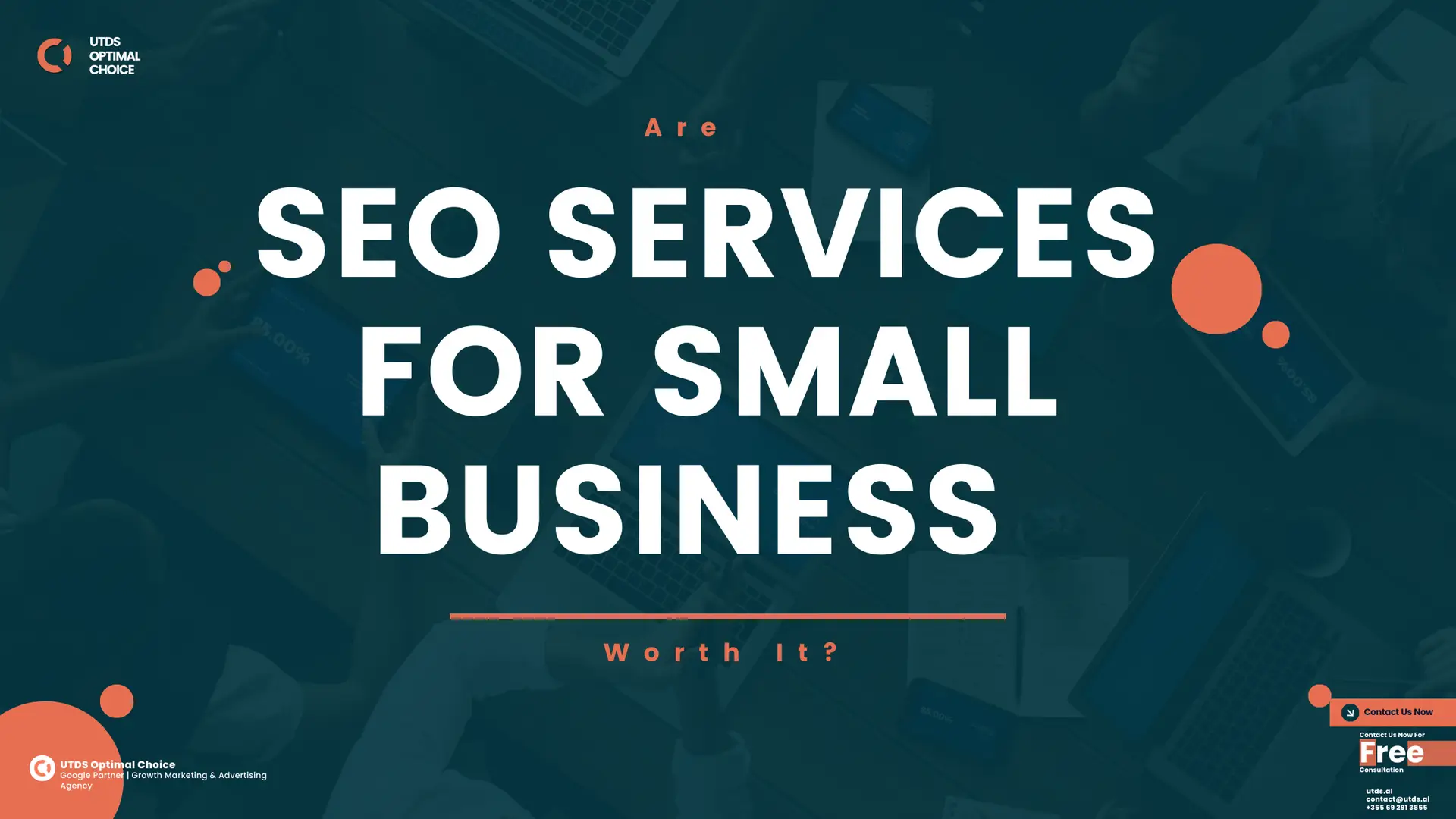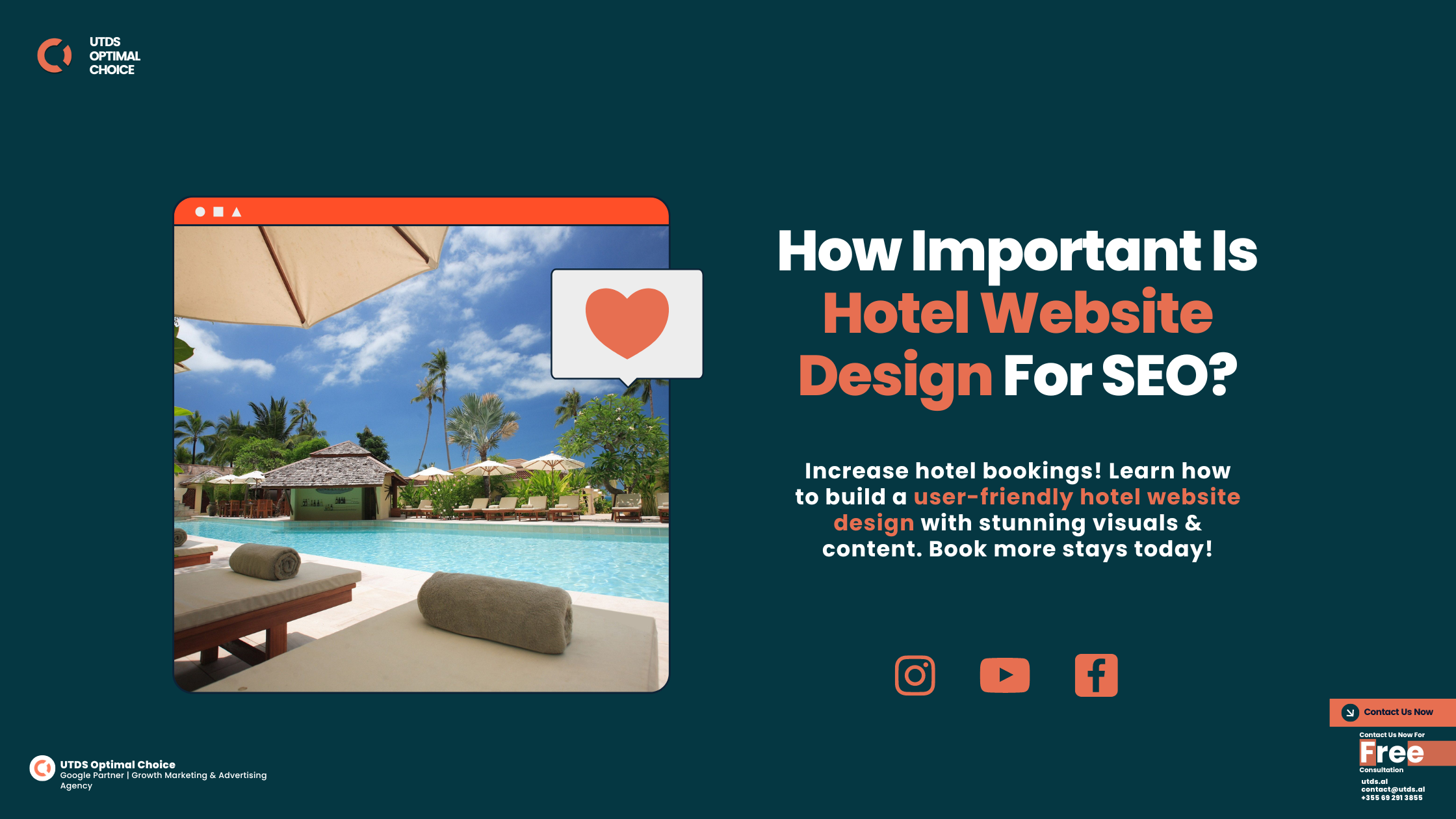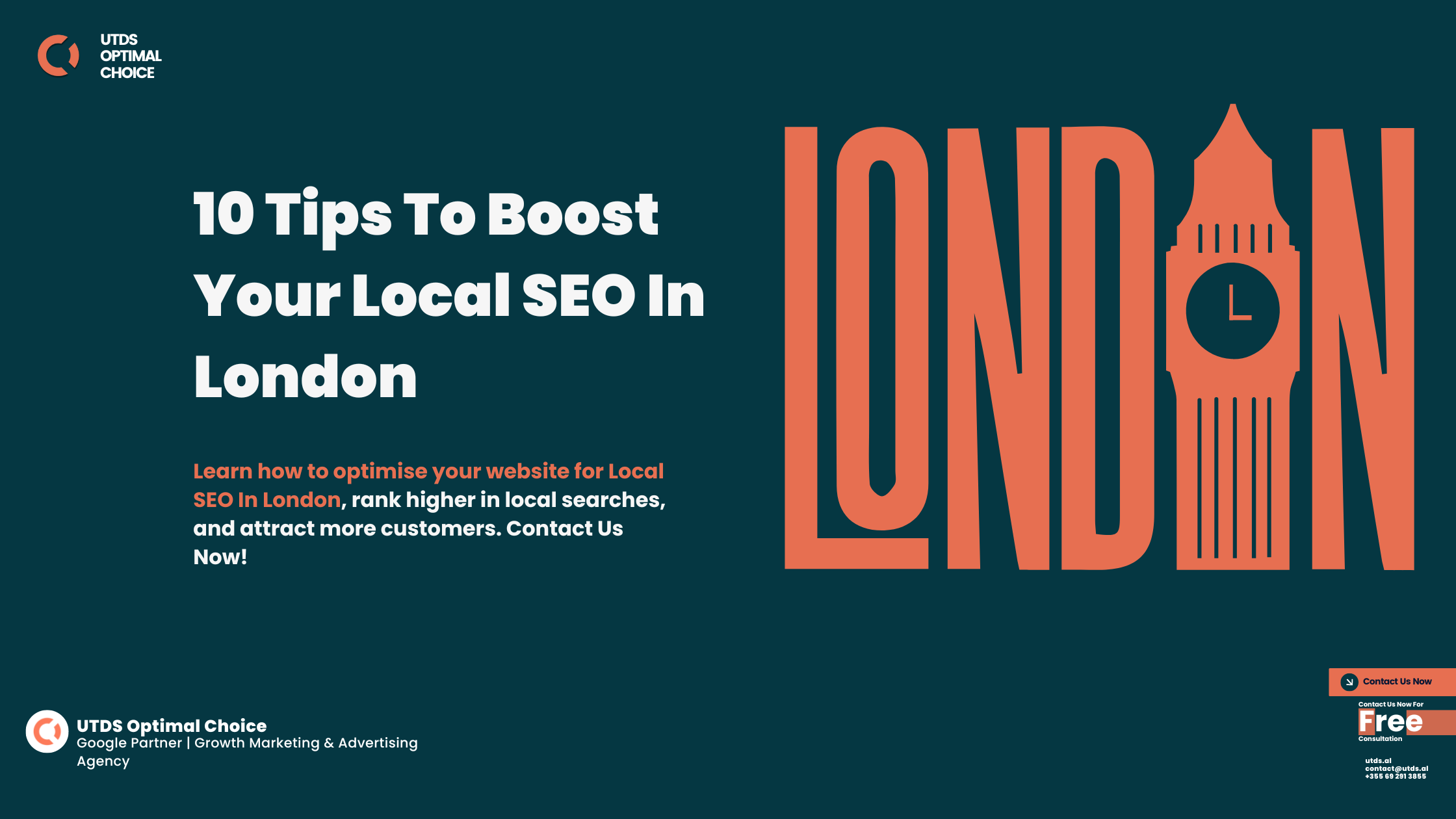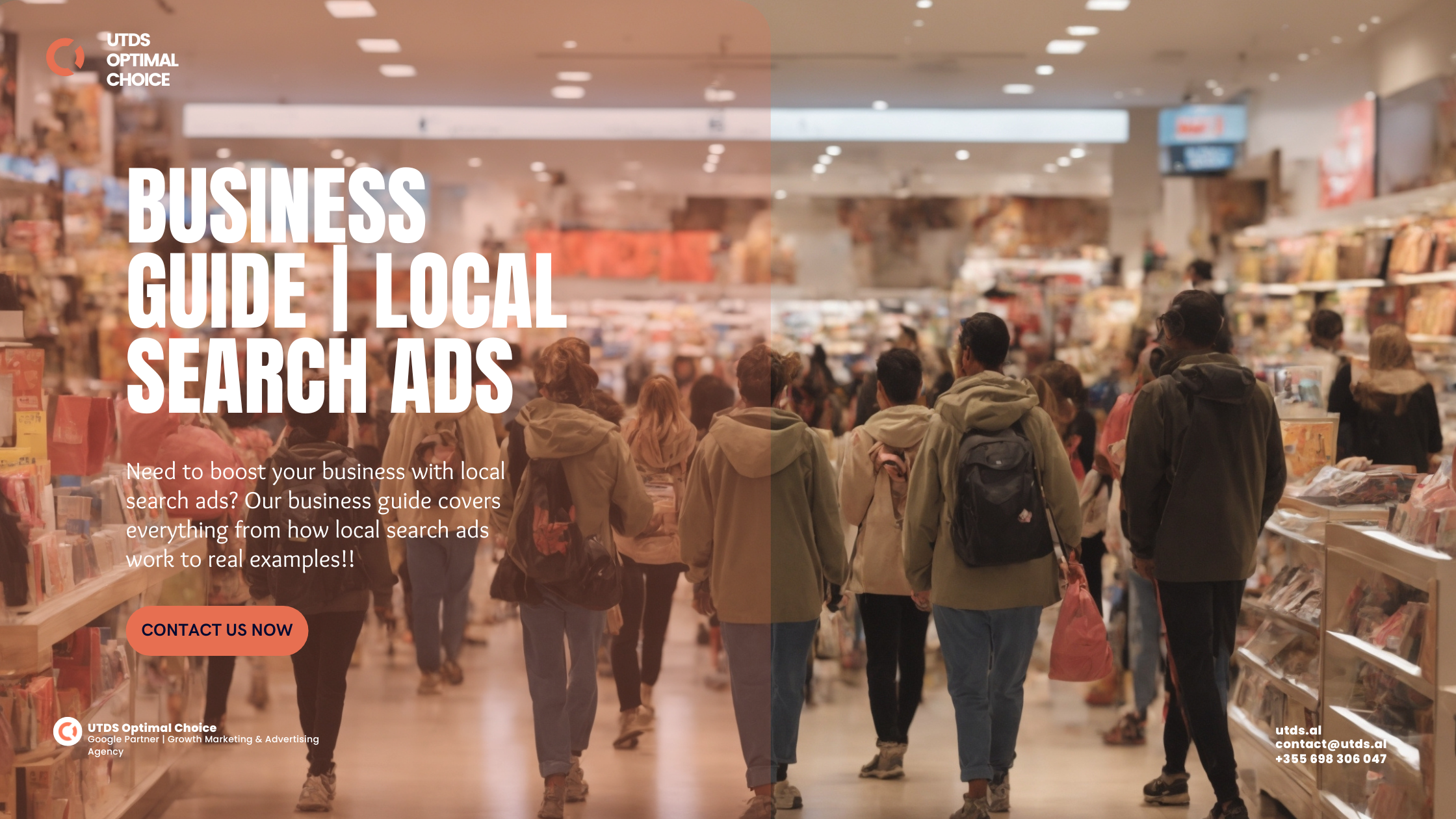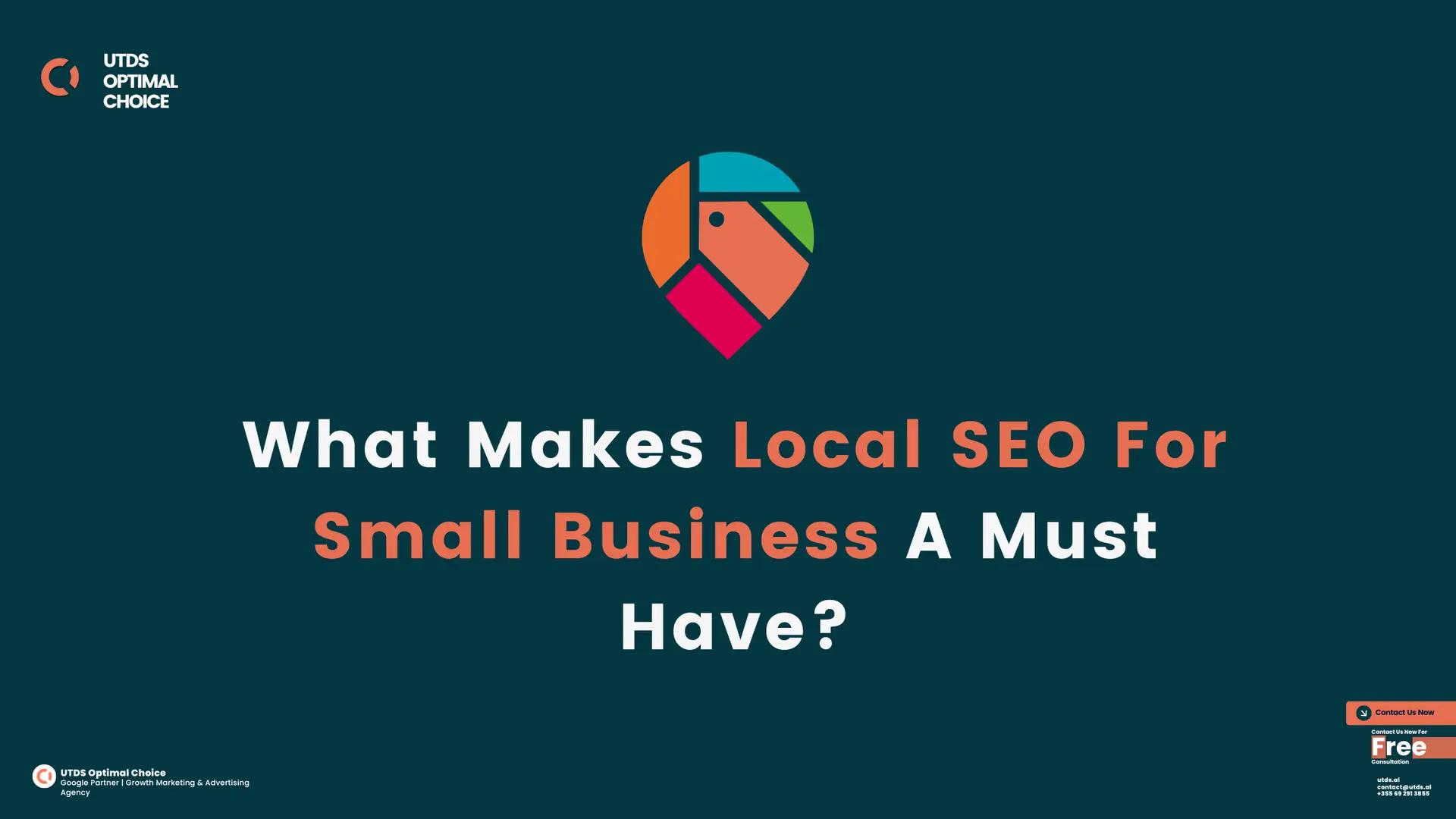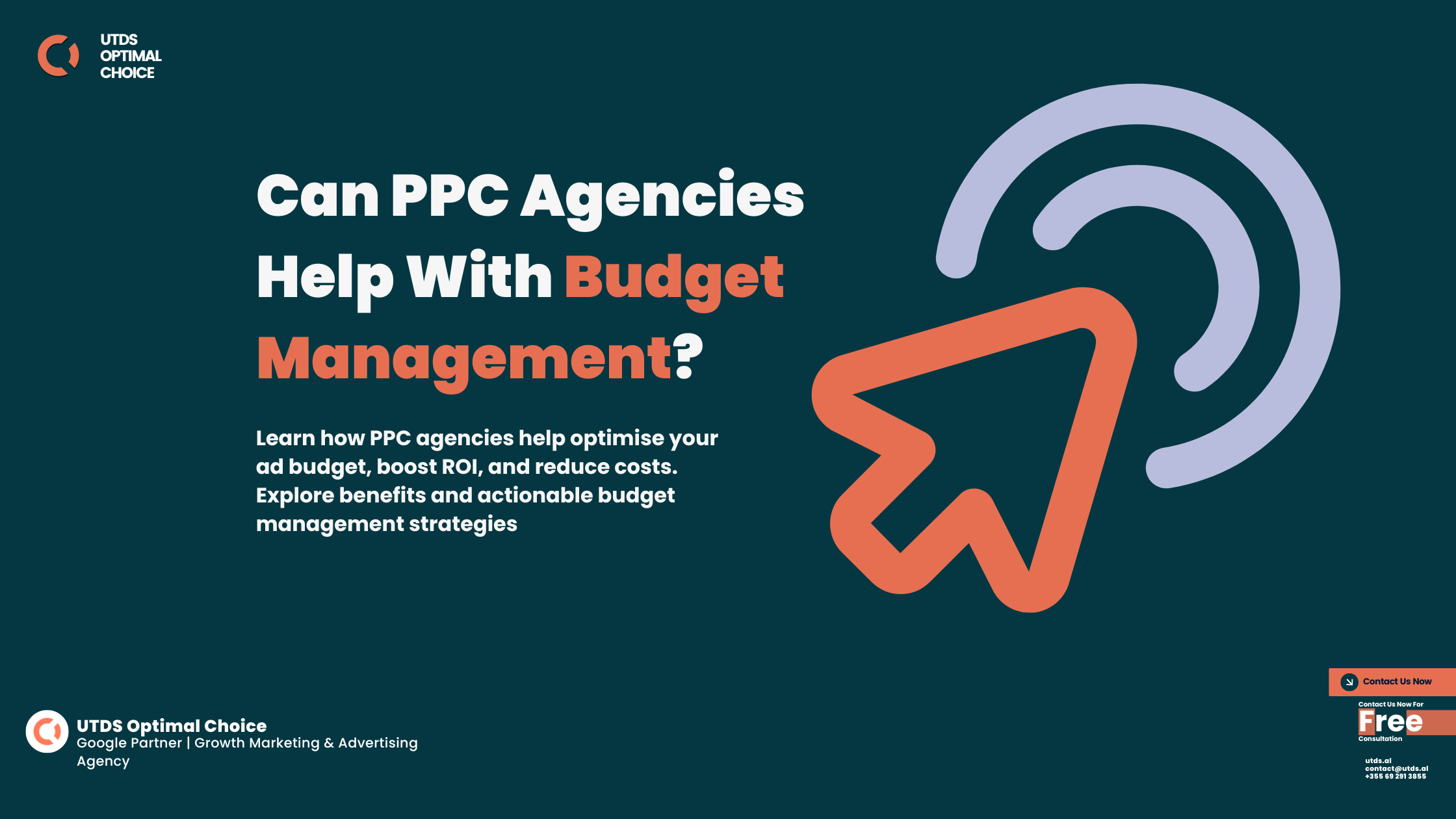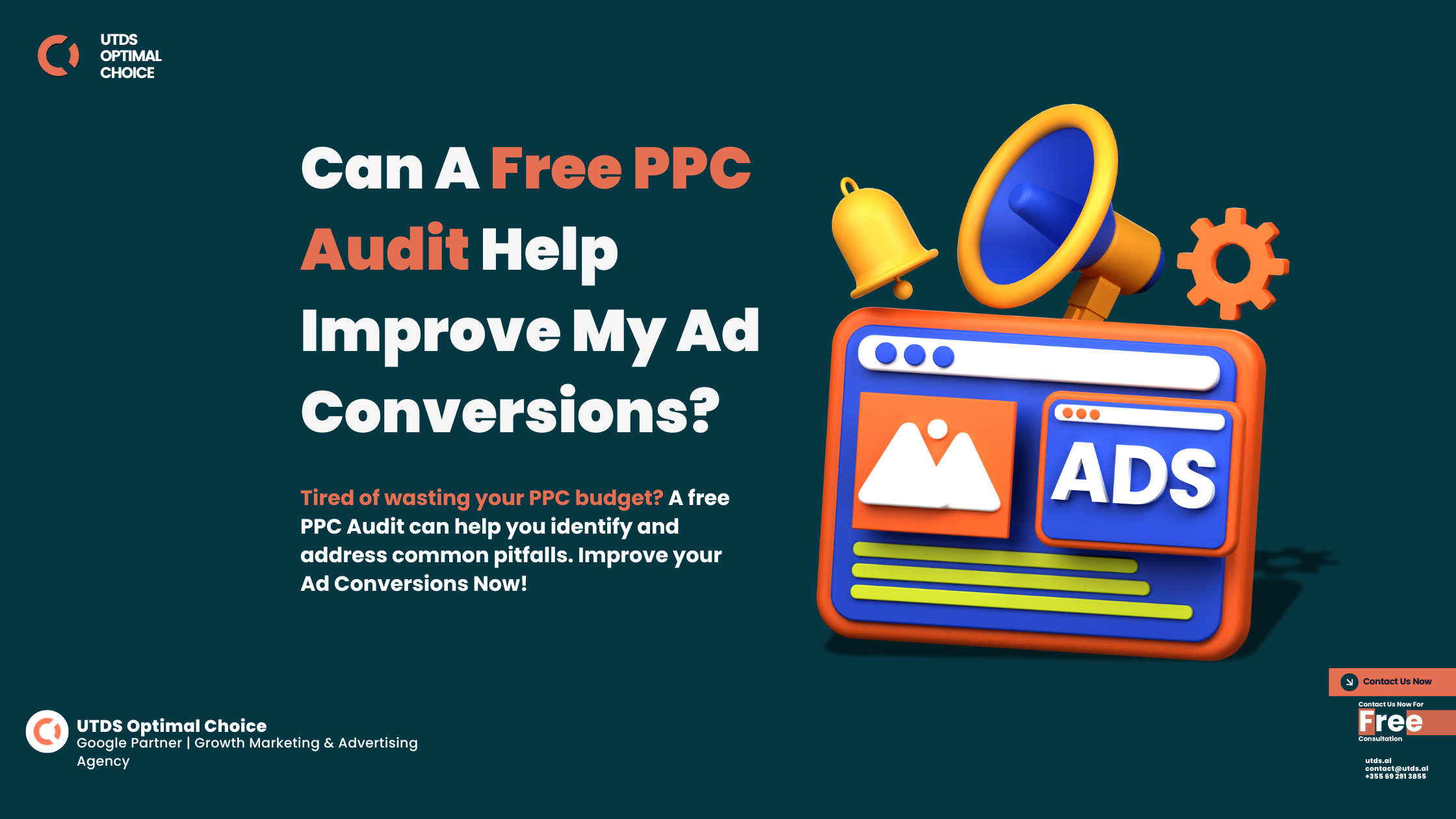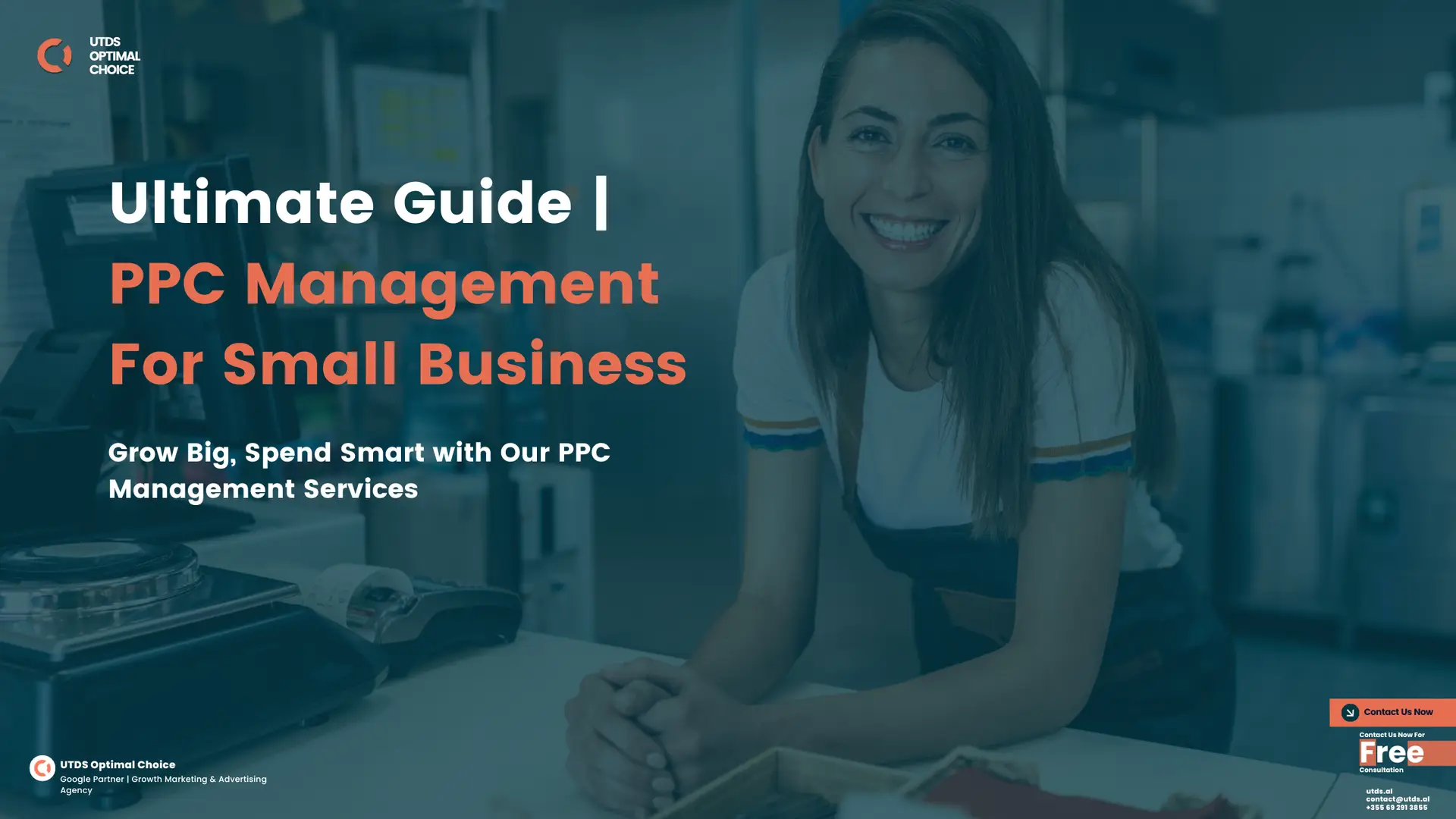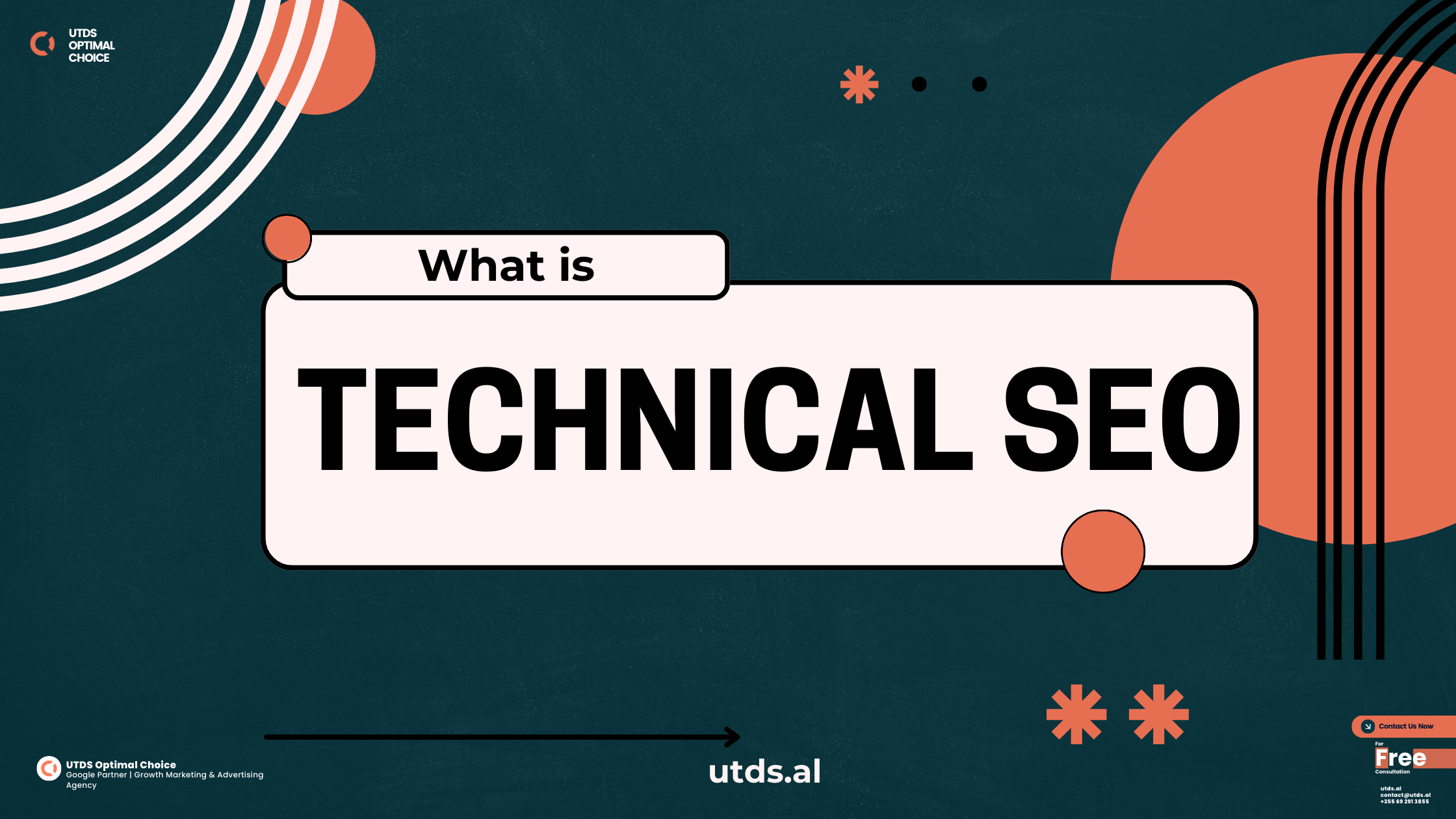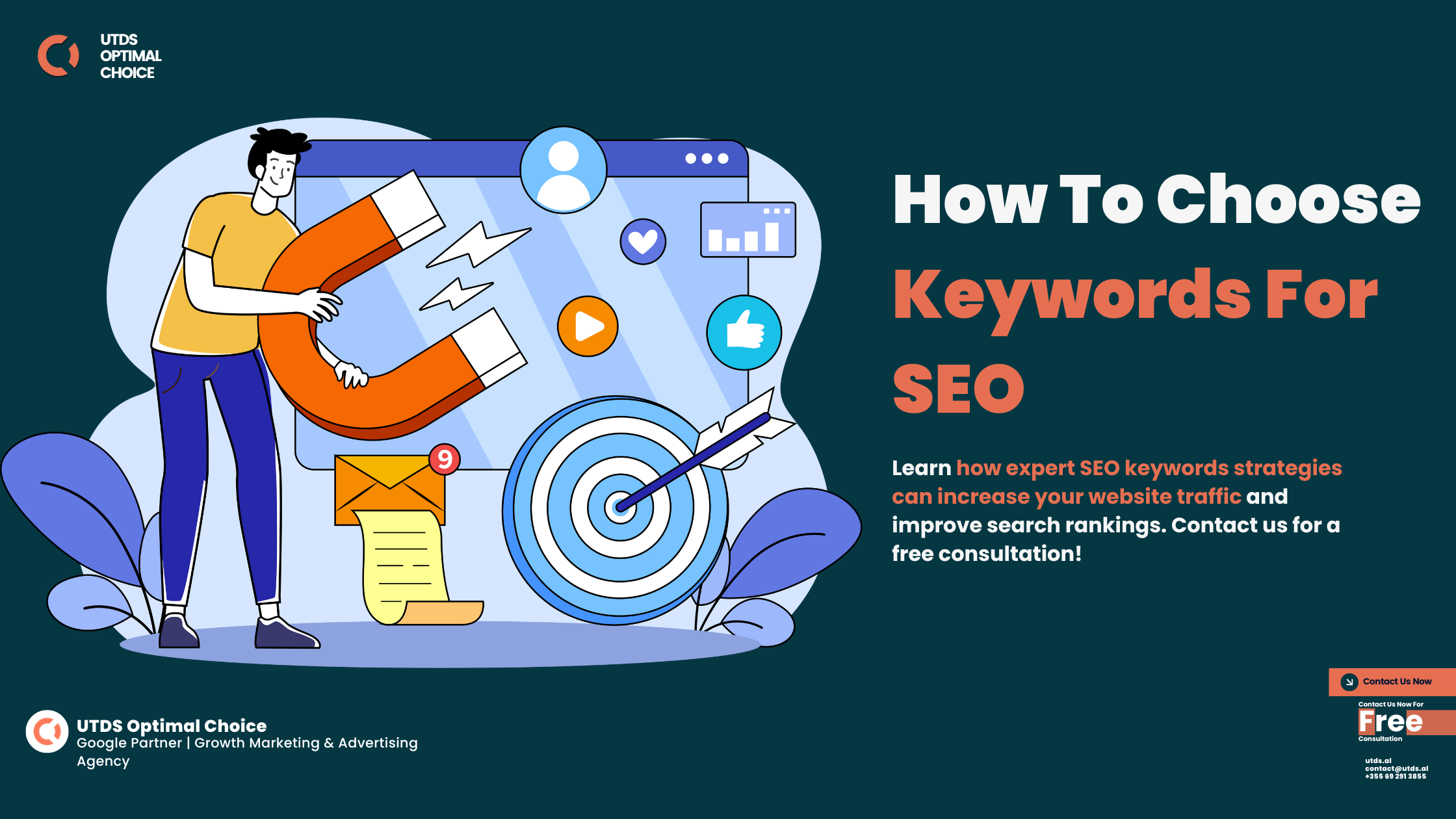When guests search online for their next holiday destination, does your hotel appear at the top? If not, you’re likely losing potential guests to competitors. At UTDS Optimal Choice, our professional Hotel SEO Services are designed to help your hotel rank higher on search engines and attract more guests. As a trusted Hotel SEO Company, we use proven strategies to drive visibility, improve bookings, and grow your business.
Attracting the right guests isn’t just about having a visually stunning website; it’s about making sure your property is visible when people search online. Professional Hotel SEO Services can boost your search rankings, drive more traffic, and convert visitors into loyal customers. Whether you’re running a boutique hotel, a resort, or a luxury villa, an experienced Hotel SEO Agency has the tools to help.
Why SEO for Hotel is important:
- Did you know that 50% of travelers search for hotels on mobile devices? With professional Hotel SEO Services, your property can rank higher for mobile and desktop searches alike, ensuring you capture this growing market.
- A reputable Hotel SEO Company like UTDS Optimal Choice understands the importance of optimising your website for both search engines and user experience, resulting in a 70% increase in direct bookings on average.
These numbers show just how important it is to rank well in search results. With specialised services like Local SEO For Hotels, you can ensure your property stands out to nearby travelers and international tourists alike.
With Search Engine Optimisation for Hotels, your property can achieve better visibility, ensuring travelers find your website first. The SEO for hotel industry plays a crucial role in helping hotels secure top ranking position in search results. Whether it’s through Hotel website SEO or comprehensive strategies offered by an SEO Agency for Hotels, optimising your digital presence ensures you stay ahead in the competitive SEO for hospitality landscape.
Why should we focus on Hotel Website SEO Now?
The hospitality industry is more competitive than ever, and search engines play a huge role in how guests choose where to stay. If your property isn’t on the first page, your competitors could be capturing your potential guests. Investing in Hotel SEO Services now ensures your hotel is ready for the next surge in bookings.
At UTDS Optimal Choice, we offer tailored Hotel SEO Services designed specifically for the hospitality industry. Our hotel seo services include keyword research, technical SEO, local SEO, and content creation, all aimed at maximising your hotel’s visibility online. Whether you’re a boutique hotel or a luxury resort, our expertise ensures you stand out in a competitive market.
Don’t let competitors take the lead. Partner with our trusted Hotel SEO Agency and see the difference it can make for your visibility, bookings, and growth. Contact us now for free consultation.
Looking to improve your hotel's visibility and attract more guests? At UTDS Optimal Choice, we specialise in providing top-tier Hotel SEO Services that help your property rank higher, attract the right audience, and drive direct bookings. As a trusted Hotel SEO Company, we use tailored strategies to ensure your success. Get started today with a free consultation. Contact us now to unlock your hotel’s full potential!
Hotel SEO Company: Best Result Driven Hotel SEO Services
What Are Hotel SEO Services?
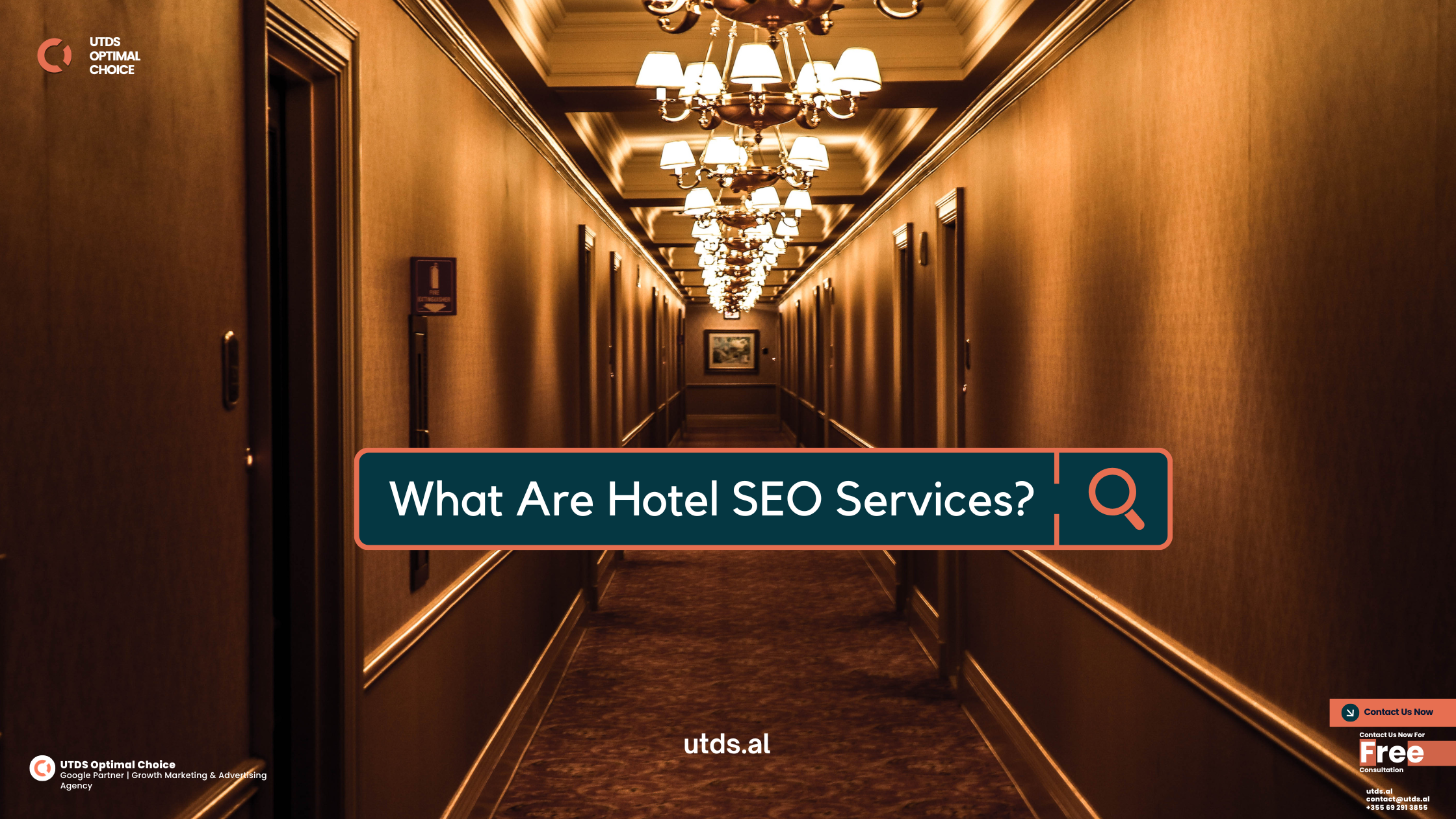
Imagine running a stunning hotel or resort, offering top-tier amenities, but struggling to attract guests because your property doesn’t appear on search engines. This is where Hotel SEO Services make all the difference.
SEO, or Search Engine Optimisation, involves tailoring your website so it appears at the top of search results when potential guests are looking for stays like yours. Whether it’s a boutique hotel in London or a luxury resort by the coast, a professional Hotel SEO Company ensures that your property gains the visibility it deserves.
What’s Included in Hotel SEO Services?
A professional Hotel SEO Agency provides a range of services designed to elevate your online presence:
- Keyword Research: As part of our tailored Hotel SEO Services, we target key phrases such as ‘luxury hotels in London‘ or ‘family-friendly resorts near me.‘ Our approach ensures your property ranks for the most valuable searches.
- On Page Optimisation: Ensuring meta tags, headers, and descriptions feature critical SEO Keywords For Hotels.
- Technical SEO: As a trusted Hotel SEO Company, we focus on optimising site speed, improving mobile responsiveness, and implementing structured data for better rankings.
- Local SEO For Hotels: Making sure your hotel ranks for location-specific searches like “hotels near Brighton.”
- Content Marketing: Creating travel guides, blog posts, and landing pages that drive traffic and bookings.
- Hotel SEO Consultant Services: Providing tailored strategies for your unique property needs, from audits to long-term growth plans.
Why do you need SEO for resorts and SEO for hotels?
The hospitality sector is highly competitive. Without optimised SEO, even the most luxurious properties can lose visibility to rivals. With dedicated SEO Services For Hotels, you can:
- Boost your rankings for valuable keywords.
- Increase website traffic.
- Drive direct bookings, reducing your reliance on OTAs.
What Makes a Good Hotel SEO Company?
A good Hotel SEO Company doesn’t just help you rank; it ensures that your property appeals to your target audience. Partnering with an SEO Agency for Hotels provides expert guidance in implementing Search Engine Optimisation for Hotels. These agencies specialise in tackling the unique challenges of the SEO for hotel industry, including technical SEO and On page Hotel website SEO. For hotels seeking to thrive in the competitive market, SEO for hospitality ensures you connect with the right audience.
Role of a Hotel SEO Company:
A trusted Hotel SEO Company isn’t just about higher rankings; it’s about crafting a complete online experience for your guests. From technical audits to creative content strategies, a reliable Hotel SEO Consultant works alongside you to ensure your property remains competitive in the ever-changing hospitality market.
Ranking on the first page of Google is no longer a luxury - it’s a necessity. With less than 1% of searchers venturing to the second page, securing a top spot in search results is critical for any hotel’s success. A reputable hotel SEO company can help your property achieve first-page visibility by implementing advanced strategies tailored to your market. Whether you’re working with a skilled hotel SEO consultant or a trusted hotel SEO agency, you’ll benefit from professional hotel SEO services designed to drive traffic and increase bookings. Effective SEO services for hotels don’t just improve rankings; they also ensure your website captures the majority of search traffic, giving you a competitive edge. Partnering with a specialised SEO agency for hotels is the key to dominating search results and attracting more direct bookings.
Why Choose A Professional Hotel SEO Agency?

Marketing a hotel online is no easy task. With so many competitors, relying on traditional methods or OTAs alone may limit your business growth. This is where a professional Hotel SEO Agency can make all the difference.
A trusted Hotel SEO Company helps you stand out in search results, attract more bookings, and reduce reliance on commission-heavy platforms. Whether you manage a boutique hotel, a family-friendly resort, or luxury villas, here’s why partnering with a specialised agency is the smartest choice for your business:
1. Industry Expertise
A Hotel SEO Agency knows how to create tailored strategies for the hospitality sector. From targeting the best SEO Keywords For Hotels to implementing advanced SEO Services For Hotels, they know what works. If you run a resort, they can even deliver dedicated SEO For Resorts, helping you attract high-end travelers looking for unforgettable stays.
2. Saves You Time
Managing SEO requires ongoing attention and expertise. A professional Hotel SEO Consultant takes this off your hands, offering services like:
- Detailed website audits.
- Custom strategies based on your business goals.
- Regular adjustments to keep up with algorithm changes.
3. Increased ROI
Unlike traditional marketing channels, SEO offers long-lasting results. With professional Hotel SEO Services, your website ranks higher in search results, driving more organic traffic. As a result, you’ll enjoy increased direct bookings while cutting back on the high commissions OTAs demand.
4. Localised Strategies for UK Hotels
A reliable Hotel SEO Company understands the challenges specific to the UK market. They’ll help you capture more local bookings through Local SEO For Hotels, ensuring your property appears in “hotels near me” searches. Plus, their content strategies can also target international travelers and expats, giving you a broader reach.
A professional Hotel SEO Agency does more than just improve rankings. They create a complete strategy to build your online presence and attract the right guests. Whether it’s through SEO Services For Hotels or tailored strategies for resorts, you’ll have a competitive edge in the market.
Benefits Of Hotel SEO Services
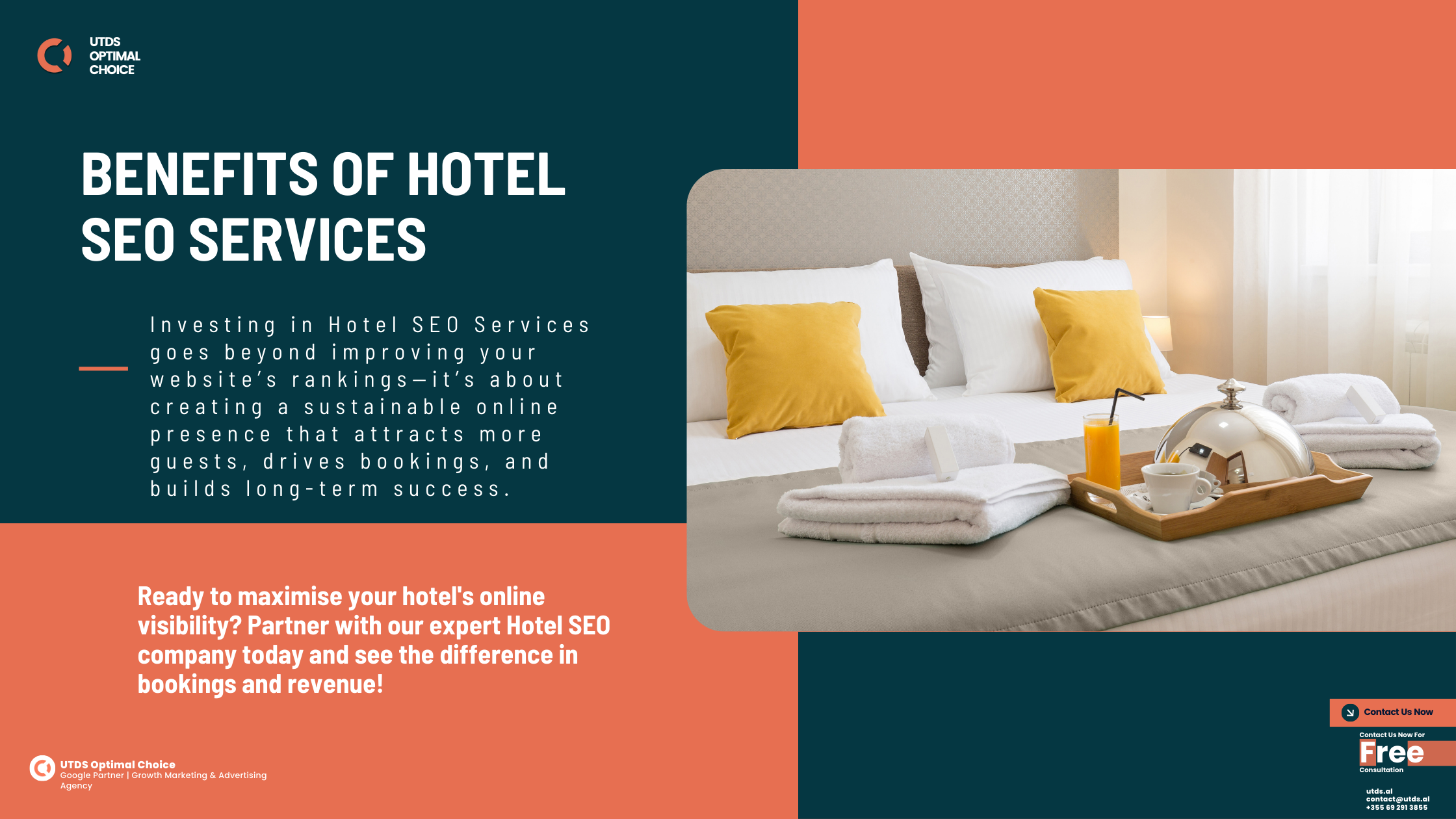
Investing in Hotel SEO Services goes beyond improving your website’s rankings, it’s about creating a sustainable online presence that attracts more guests, drives bookings, and builds long-term success. Here are the top benefits your hotel can expect:
1. Increased Organic Traffic
A focus on Search Engine Optimisation for Hotels improves rankings, while Hotel website SEO ensures optimal site performance. By targeting specific needs of the SEO for hotel industry, businesses can achieve higher conversions. Moreover, SEO for hospitality allows properties to tailor content and attract ideal guests. By partnering with a trusted Hotel SEO Company, your website will rank higher for essential SEO Keywords For Hotels. This means more travelers will find your property when searching for hotels, resorts, or vacation rentals in your area.
2. Better Guest Targeting
SEO allows you to tailor your online strategy to reach the right audience. With Local SEO For Hotels, you can attract nearby travelers and those looking for specific types of stays, such as family-friendly hotels or luxury resorts. A professional Hotel SEO Consultant ensures your strategy aligns with your property’s goals.
3. Higher Direct Bookings
With optimised content and improved visibility, Hotel SEO Services drive more direct bookings, reducing your reliance on OTAs. This saves you on commission fees while giving you greater control over the guest experience.
4. Enhanced User Experience
A fast, mobile friendly website isn’t just great for guests, it’s also a ranking factor for search engines. A reliable Hotel SEO Agency focuses on technical improvements like speed optimisation, intuitive navigation, and seamless booking processes, ensuring your guests have the best experience possible.
5. Improved Return on Investment (ROI)
Unlike traditional advertising, SEO is a long-term investment. By working with an experienced Hotel SEO Consultant, your property can achieve measurable ROI through increased organic traffic and bookings. Once your site starts ranking, the traffic is essentially free, making SEO one of the most cost-effective marketing strategies available.
6. Visibility for Resorts and Luxury Properties
For resorts and villas, specialised SEO For Resorts helps target affluent travelers seeking high-end experiences. Through seasonal strategies and luxury-focused keywords, your property can attract guests willing to invest in premium stays.
Maximise your hotel's online visibility with optimised on page SEO! Our expert team at UTDS Optimal Choice knows exactly how to fine-tune your website for better search rankings and a seamless user experience. Let us help you attract more direct bookings with a fully optimised website. Get Your Free Website Audit today! Contact Us Now!
Local SEO For Hotels
Local Search Engine Optimisation for Hotels ensures your property ranks for such queries like “Hotel Near Me” o “best place to stay near me” . Through Hotel website SEO and support from an experienced SEO Agency for Hotels, you can dominate local search results. This is a critical part of SEO for hospitality, as it connects you with nearby travelers actively seeking accommodations..
Imagine a traveler searching for “hotels near me” on their phone while planning a weekend getaway. If your property isn’t optimised for local searches, you’re missing out on potential bookings. This is where Local SEO For Hotels becomes essential, helping your property stand out in the crowded hospitality market.
What Is Local SEO For Hotels?
Local SEO ensures your hotel appears prominently in location-specific searches, including Google Maps and “near me” queries. A professional Hotel SEO Company leverages Hotel SEO Services to optimise your online presence for these searches, attracting guests actively looking for accommodations nearby.
Whether you’re managing a boutique hotel in Edinburgh, a family-friendly resort in Brighton, or a luxury villa, Local SEO For Hotels ensures your property gets noticed by nearby travelers. It’s not just about visibility, it’s about being the first choice for bookings.
Key Benefits of Local SEO for Hotels
- Increased Local Bookings:
By targeting location-specific keywords, your property becomes more visible to guests looking for immediate stays or planning trips.
Example: Ranking for searches like “seaside resorts near Devon” or “hotels near Heathrow Airport.” This is a key feature of specialised SEO Services For Hotels. - Enhanced Google Maps Visibility:
A trusted Hotel SEO Agency will optimise your Google My Business profile with accurate information, compelling images, and guest reviews. This increases your chances of appearing in the local pack, a crucial spot for gaining guest attention. - Target Nearby Travelers and Expats:
With Local SEO For Hotels, you can attract local staycationers, expats, and last-minute bookers. Resorts and villas also benefit from targeted SEO For Resorts, ensuring high-end travelers discover your property.
How Local SEO For Hotels Work
- Optimising Your Website for Local Keywords:
Using terms like “hotels near Manchester city centre” or “luxury resorts in Scotland” ensures your property ranks for high user intent searches. A professional Hotel SEO Consultant ensures your website is optimised for these opportunities. - Schema Markup for Hotels:
Adding structured data like pricing, availability, and amenities improves your chances of appearing in rich search snippets, helping guests find what they need faster. - Content Marketing for Local Audiences:
A reliable Hotel SEO Company will create localised content such as blogs about nearby attractions, seasonal events, or hidden gems, keeping your website fresh and engaging.
Why Local SEO For Hotel Matters Now
With more travelers choosing staycations and local getaways, optimising for Local SEO For Hotels is essential. This trend is particularly strong in the UK, where location specific searches have grown significantly. By investing in Hotel SEO Services, your property can capture this growing demand and secure more bookings.
Ready to boost your bookings with our expert Hotel SEO Services?
Partner with the Hotel SEO Company trusted by top hospitality brands. Let’s grow your online presence today! Contact us today for a free consultation and start seeing real results!
Specialised Hotel SEO Services For Resorts And Luxury Stays
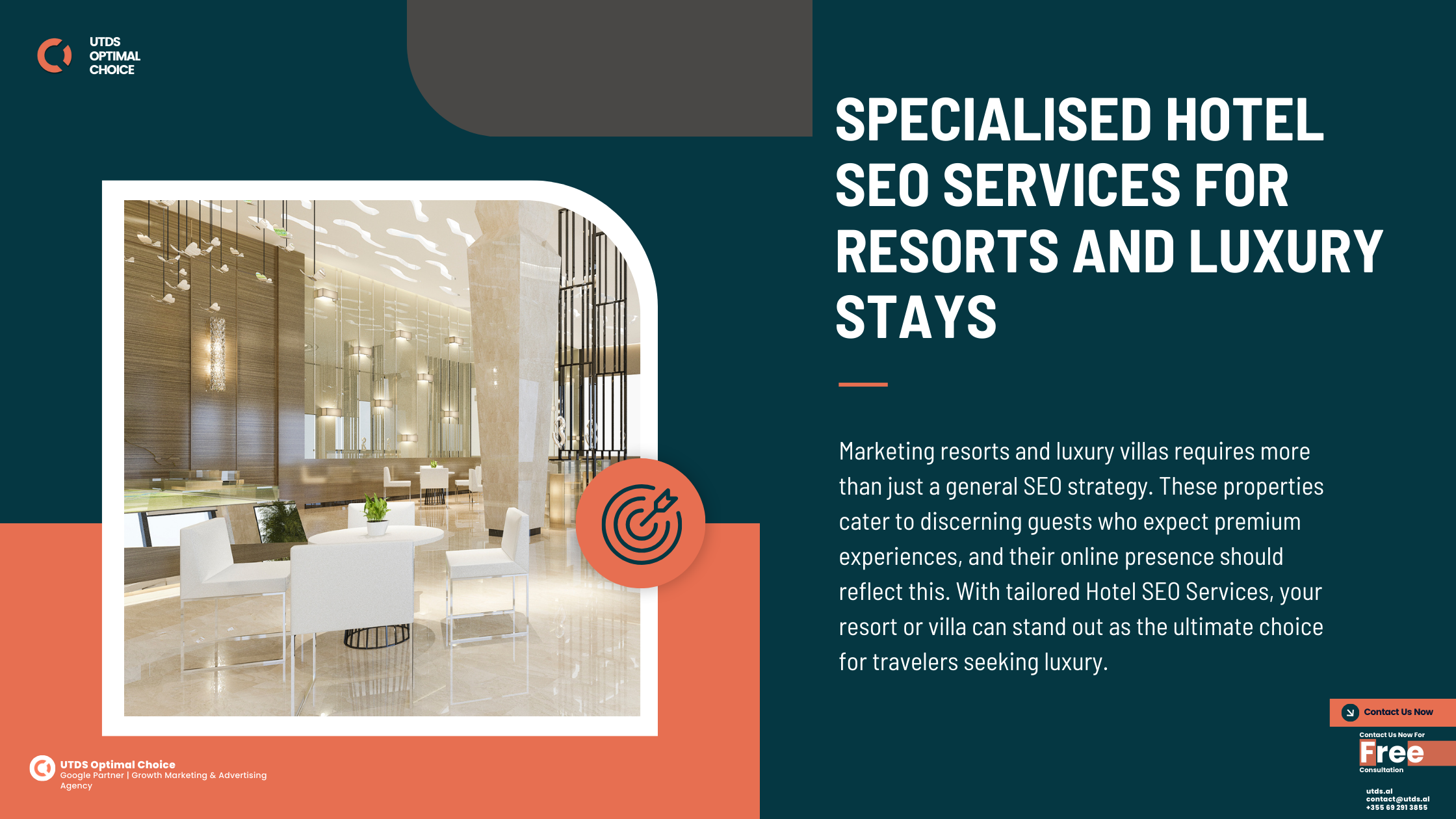
Marketing resorts and luxury villas requires more than just a beginners SEO strategy. These properties cater to discerning guests who expect premium experiences, and their online presence should reflect this. With tailored Hotel SEO Services, your resort or villa can stand out as the ultimate choice for travelers seeking luxury.
A professional Hotel SEO Company specialises in crafting strategies designed for high-end properties. From SEO For Resorts to targeting affluent international travelers, they ensure your website ranks for the right SEO Keywords For Hotels and captures the attention of your ideal audience.
Key Features of Specialised SEO for Resorts and Luxury Properties
- Luxury-Focused Keyword Targeting:
Keywords like “all-inclusive resorts in Cornwall” or “luxury villas in Scotland” are essential for attracting high-net-worth travelers. A skilled Hotel SEO Consultant will optimise your website to rank for these high-value terms, boosting visibility and traffic. - Seasonal SEO Campaigns:
Resorts and villas often see demand peaks during holidays and summer seasons. Tailored SEO Services For Hotels include dynamic seasonal campaigns that capture holiday traffic when it matters most. - Optimised Visual Content:
Eye-catching visuals like videos of your infinity pool or panoramic photos of your villa are crucial for luxury stays. A reliable Hotel SEO Agency ensures your visuals are not only stunning but also optimised for speed and search engines. - Localised Content with Global Appeal:
Many resorts attract both local and international guests. By using Local SEO For Hotels and multilingual strategies, your property can reach expats and global travelers searching for unforgettable experiences.
Why Resorts and Luxury Villas Need Tailored SEO Services
Unlike standard hotels, resorts and villas offer unique experiences that appeal to niche audiences. Specialised SEO For Resorts focuses on:
- Highlighting premium amenities like private pools, exclusive spas, or Michelin starred dining.
- Capturing seasonal tourists and last-minute bookers with geo-targeted campaigns.
- Leveraging SEO Keywords For Hotels to improve rankings for specific luxury searches.
How a Hotel SEO Company Delivers Results for Resorts
A trusted Hotel SEO Company delivers measurable results for resorts and villas by:
- Conducting detailed keyword research for high-converting phrases like “luxury seaside resorts” or “exclusive villas near London.”
- Building landing pages that showcase your property’s unique selling points.
- Implementing long-term growth strategies that enhance your online authority while maintaining relevance for both local and international guests.
How Hotel SEO Services Attract International Tourists And Expats
The UK is a top destination for international travelers and expats, offering everything from vibrant city life in London to serene countryside retreats. But how do you ensure your property stands out in this competitive market? The answer lies in Hotel SEO Services.
A professional Hotel SEO Company uses targeted strategies to make your property visible to global audiences. From Local SEO For Hotels to multilingual content, these services help attract high-intent guests searching for properties like yours.
Key Strategies of Hotel SEO Services for Attracting Global and Expat Audiences
- Multilingual SEO for International Travelers:
Many international tourists search for hotels and resorts in their native language. A trusted Hotel SEO Agency ensures your website includes localised landing pages and content to rank for terms like “luxury seaside resorts in the UK” or “holiday villas in London.” This is especially important for high-end properties using SEO For Resorts strategies. - Geo-Targeted Campaigns for Expats:
Expats often search for nearby accommodations for weekend getaways or when hosting visiting family. By leveraging Local SEO For Hotels and targeted keywords such as “resorts for expats near me,” your property becomes their top choice. - Promoting Unique Features With SEO:
International guests are drawn to properties that offer distinctive experiences. With tailored SEO Services For Hotels, you can showcase your unique selling points, such as proximity to historical landmarks, luxury spa facilities, or breathtaking countryside views. - Seasonal SEO Campaigns:
Peak tourist seasons and expat holidays are perfect opportunities to attract more guests. By targeting seasonal keywords with SEO Keywords For Hotels, such as “Christmas getaways in the UK” or “summer resorts near Cornwall,” your property remains visible during the busiest times.
Why These Hotel SEO Strategy Work
The global travel market is highly competitive, and international guests rely heavily on search engines to make decisions. A skilled Hotel SEO Consultant helps your property:
- Rank for high-value international and seasonal searches.
- Build trust with multilingual content and optimised visuals.
- Increase bookings by capturing both tourists and expats looking for stays.
Don’t miss out on international and expat travelers. Partner with our professional Hotel SEO Company to build your global presence and attract high-value guests to your property today.
UK hotel industry has experienced significant growth, with its market size reaching approximately £24.7 billion in 2023, up from £16.42 billion in 2022. In such a rapidly expanding market, standing out among competitors is essential. Partnering with a specialised hotel SEO company can enhance your online presence, ensuring your establishment attracts more direct bookings. Engaging with a professional hotel SEO consultant provides tailored strategies to improve your search engine rankings. Comprehensive hotel SEO services are designed to optimise your website, making it more visible to potential guests. Investing in SEO services for hotels is a strategic move to capitalise on the industry's growth. Collaborating with a reputable hotel SEO agency ensures your marketing efforts are effective and aligned with industry trends. Choosing an experienced SEO agency for hotels can significantly boost your online visibility and competitiveness in the UK market.
Proven SEO Strategies From Leading Hotel SEO Company
Standing out in the competitive hospitality market requires more than just a beautiful property, it requires a strong online presence. A trusted Hotel SEO Company leverages proven strategies to help your property rank higher, drive more traffic, and convert online visitors into loyal guests.
Here are some of the key strategies used by a professional Hotel SEO Agency:
1. Keyword Research
A top priority is identifying high-converting SEO Keywords For Hotels, such as “luxury seaside resorts in Cornwall” or “romantic getaways near Edinburgh.” For properties like resorts, a specialised approach with SEO For Resorts targets affluent travelers looking for unique stays.
2. On-Page Hotel Search Engine Optimisation
On page SEO focuses on improving your website’s structure and content to meet search engine standards. Key steps include:
- Crafting meta titles and descriptions with essential SEO Keywords For Hotels.
- Adding secondary keywords like SEO Services For Hotels to enhance relevance.
- Structuring pages to highlight your property’s unique features, such as “private villas with sea views” or “family-friendly resorts.”
3. Technical SEO For Hotels Enhancements
Technical issues can hurt your rankings. A skilled Hotel SEO Consultant ensures your site is optimised for:
- Faster loading times to improve user experience.
- Mobile responsiveness, crucial for capturing bookings from mobile searches.
- Schema markup that highlights key details like pricing, availability, and reviews, making your property stand out in search results.
4. Local SEO For Hotels Implementation
For hotels targeting nearby guests, Local SEO For Hotels is essential. Strategies include:
- Optimising Google My Business profiles with accurate details and guest-friendly descriptions.
- Adding localised content to attract visitors searching for properties like “hotels near London” or “seaside resorts in Brighton.”
- Building backlinks from local travel guides and directories, a critical part of SEO Services For Hotels.
5. Content Marketing and Blogging
Creating engaging content is a powerful way to attract traffic. A professional Hotel SEO Agency develops:
- Travel guides, such as “Top 10 Activities Near Lake District Resorts.”
- Blog posts that highlight seasonal offers or unique experiences at your property. This not only boosts rankings but also positions your property as a trusted authority in its location.
6. Backlink Building and Strategic Partnerships
Earning backlinks from reputable travel blogs, directories, and local businesses strengthens your site’s domain authority. For resorts, this is especially important, as SEO For Resorts benefits significantly from partnerships with luxury-focused websites.
Why These Hotel SEO Agency Strategies Work
Each strategy is tailored to meet the unique needs of the hospitality industry. From targeting the right keywords to creating optimised content, a professional Hotel SEO Company ensures your property not only ranks higher but also attracts guests ready to book.
Take the next step in transforming your online presence. Partner with our experienced Hotel SEO Agency to implement these proven strategies and drive more bookings today.
Grow your hotels search rankings with expert SEO! At UTDS Optimal Choice, we implement advanced SEO strategies tailored to the hospitality industry. From optimising your content to building high-quality backlinks, we’ll help you rank higher and attract more guests. Let’s Improve Your SEO and drive more direct bookings today! Contact us now!
Ready to boost your bookings with our expert Hotel SEO Services?
Partner with the Hotel SEO Company trusted by top hospitality brands. Let’s grow your online presence today! Contact us today for a free consultation and start seeing real results!
Hotel Website Optimisation: A Crucial Component Of Hotel SEO Services
Your hotel’s website isn’t just a showcase for your property, it’s the foundation of your online presence. If your site isn’t optimised for speed, usability, and search engines, potential guests may book elsewhere. This is why website optimisation is a core part of professional Hotel SEO Services.
A reliable Hotel SEO Company focuses on ensuring your website performs flawlessly, from mobile usability to rich search snippets. Let’s explore how these strategies help your property shine online.
1. Faster Loading Speeds
Today’s travelers have little patience for slow websites. Studies show that users abandon sites that take more than three seconds to load. A trusted Hotel SEO Agency implements advanced techniques like caching, image compression, and code optimisation to ensure your site loads quickly. This is crucial for attracting guests to high-end properties like resorts, where specialised SEO For Resorts plays a significant role.
2. Mobile Friendly Design
With over 50% of hotel bookings made on mobile devices, mobile optimisation is no longer optional, it’s essential. A professional Hotel SEO Consultant ensures your site is responsive and easy to navigate on any device. This is a critical aspect of SEO Services For Hotels, particularly for reaching tech-savvy guests who prefer mobile-first browsing.
3. Schema Markup for Rich Search Results
Schema markup helps search engines display detailed information about your property directly in search results. Whether it’s pricing, availability, or guest reviews, structured data increases your chances of appearing in rich snippets. A well-optimised Hotel SEO Services strategy ensures you rank for competitive SEO Keywords For Hotels, making your property more appealing to potential guests.
4. Clear Navigation and Booking Paths
Your website should guide guests effortlessly from browsing to booking. A professional Hotel SEO Agency ensures navigation menus are simple, booking pages are fast, and calls-to-action are clear. This minimises drop-offs and improves your conversion rate, aligning with best practices for Local SEO For Hotels.
5. Optimised Visual Content
Luxury properties like resorts rely heavily on visuals to captivate their audience. However, unoptimised images can slow your site down. A reliable Hotel SEO Company ensures your images and videos are compressed without sacrificing quality, enhancing both page speed and user experience. This is particularly vital for properties benefiting from SEO For Resorts strategies.
6. Local SEO For Hotels Integration
For properties targeting nearby guests, integrating local elements like Google Maps and regional content boosts visibility. Whether you’re showcasing “seaside resorts in Brighton” or “luxury villas near Manchester,” Local SEO For Hotels ensures your website caters to location-based searches.
Why Hotel Website SEO Optimisation Matters
Your website often forms a guest’s first impression of your property. By optimising for speed, mobile usability, and rich snippets, you create a user-friendly experience that drives bookings. Website optimisation is a cornerstone of professional SEO Services For Hotels, helping your property thrive in a competitive market.
Don’t let an underperforming website hold back your business. Partner with a leading Hotel SEO Company to unlock your website’s full potential and boost your bookings today.
Understanding that travelers often spend weeks or even months researching their ideal trip highlights the complexity of consumer behavior in the hospitality sector. To effectively capture this audience, partnering with a specialised hotel SEO company is essential. Such a company can develop tailored strategies that align with the extended research phase of potential guests. Engaging a professional hotel SEO consultant ensures that your hotel's online presence is optimised to meet the specific needs and search behaviors of travelers. Comprehensive hotel SEO services can enhance your website's visibility during the critical stages of a traveler's decision-making process. By investing in SEO services for hotels, you position your establishment to effectively engage with potential guests throughout their research journey. Collaborating with a reputable hotel SEO agency provides the expertise needed to navigate the complexities of traveler behavior. Choosing an experienced SEO agency for hotels ensures that your marketing strategies are data-driven and aligned with industry best practices.
Improving Guest Experience Through Hotel SEO Services
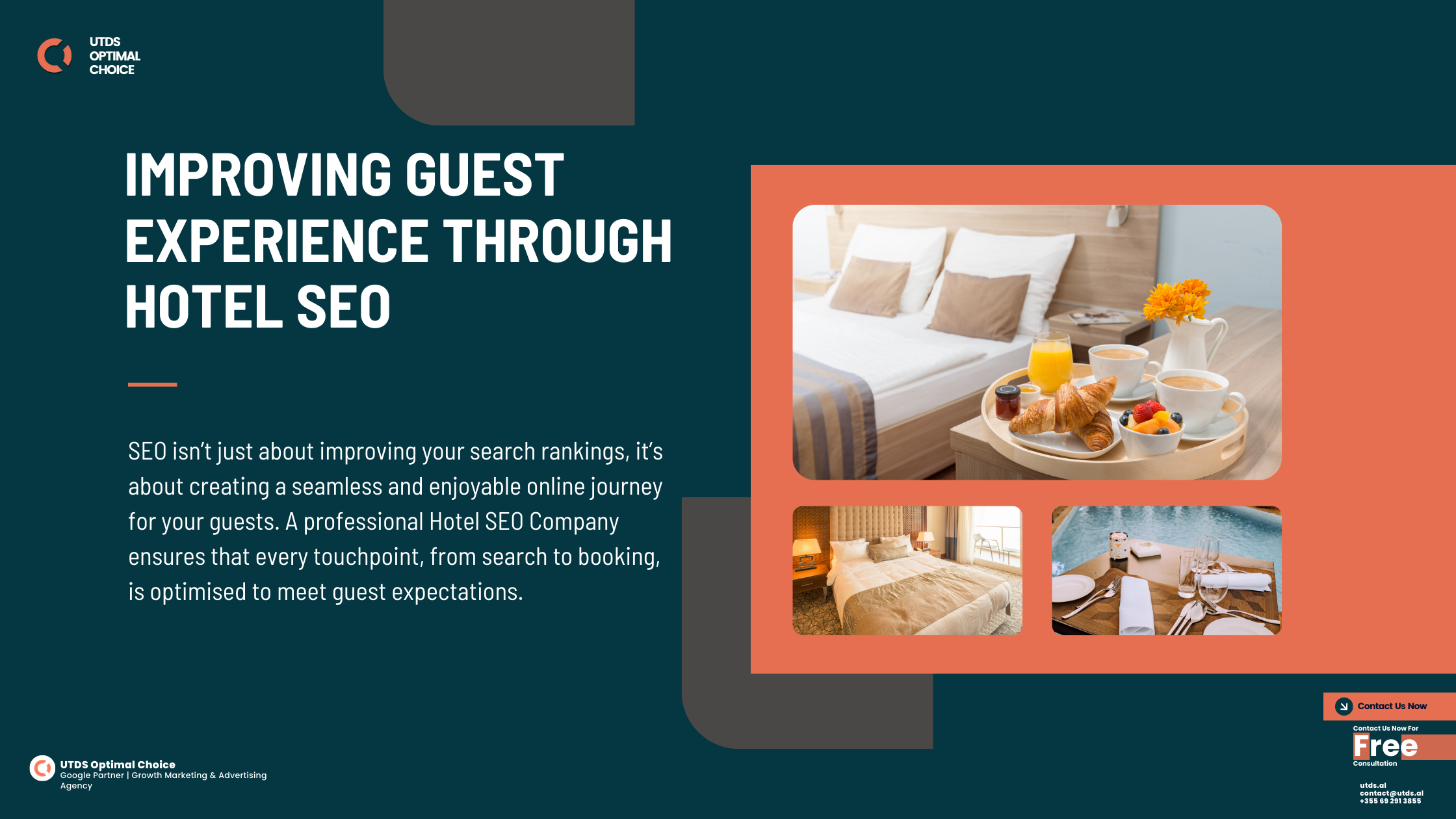
SEO isn’t just about improving your search rankings, it’s about creating a seamless and enjoyable online journey for your guests. A professional Hotel SEO Company ensures that every touchpoint, from search to booking, is optimised to meet guest expectations.
Here’s how Hotel SEO Services directly enhance the guest experience:
1. Faster and Easier Navigation
Guests expect to find the information they need in seconds. With a well-structured website:
- Pages load quickly, preventing users from abandoning the site.
- Navigation menus are intuitive, guiding users to key sections like room options or local attractions.
- Booking paths are clear and simple, minimising drop-offs—a strategy often applied in SEO Services For Hotels.
2. Mobile-Friendly Design
With over half of hotel bookings made on mobile devices, mobile optimisation is critical. A skilled Hotel SEO Consultant ensures that your website is responsive and user-friendly on all screen sizes. This is especially valuable for resorts targeting last-minute bookings, where SEO For Resorts ensures visibility for high-intent mobile searches.
Optimising for mobile devices is a critical part of Hotel website SEO. By focusing on Search Engine Optimisation for Hotels, you ensure your property ranks higher in mobile search results. Additionally, the SEO for hotel industry emphasises tailored solutions to help businesses capture this growing audience. With support from our SEO Agency for Hotels, your property can achieve measurable results.
3. Rich Snippets Through Schema Markup
Using schema markup, a professional Hotel SEO Agency enables your property to stand out in search results with rich snippets that display pricing, availability, and guest reviews. This visibility helps guests make informed decisions, especially when searching for properties using SEO Keywords For Hotels.
4. Tailored Content for Local and International Guests
Creating engaging and relevant content improves both user experience and SEO. A reliable Hotel SEO Company will develop:
- Travel guides featuring local attractions, appealing to nearby guests through Local SEO For Hotels.
- Blogs and landing pages tailored to international travelers or specific audience segments, ensuring global appeal.
5. Local SEO for Improved Accessibility
Accurate local information is essential for guests searching nearby. Whether it’s providing directions, highlighting local amenities, or promoting nearby attractions, Local SEO For Hotels ensures your property ranks for “near me” searches and captures last-minute bookings.
Why Guest Experience Is Essential for SEO
Google prioritises websites that offer an exceptional user experience. When your site is fast, mobile-friendly, and rich with valuable content, you’re not only satisfying guest needs but also improving your rankings. It’s a strategy that benefits both your guests and your business.
Your website is the first impression most guests have of your property. Partner with a leading Hotel SEO Company to optimise your site and create a guest experience that drives bookings.
Case Studies And Examples
To illustrate the impact of effective hotel SEO, let’s look at a few real-life examples and case studies:
The Ritz-Carlton Hotel Company
The Ritz-Carlton is a luxury hotel chain that has consistently invested in SEO and content marketing strategies. By creating high-quality, keyword optimised content on their website and blog, optimising their local listings, and implementing schema markup, they’ve been able to rank well for competitive keywords and attract more qualified traffic to their website.
Marriott International
Marriott, one of the largest hotel chains in the world, has leveraged various SEO tactics, including a strong focus on local SEO and user-generated content. By encouraging guests to leave reviews and share their experiences on social media, Marriott has been able to build trust, improve their online reputation, and boost their visibility in local search results.
Hilton Hotels & Resorts
- Implemented Schema.org markup across their website, resulting in an 8% increase in organic traffic and a 15% improvement in click-through rates for rich results
- Their AI-powered virtual concierge, “Connie,” has handled over 1 million guest interactions, leading to a 20% increase in direct bookings from the hotel website
The Venetian Resort Las Vegas
- Invested in creating high-quality visual content, including virtual tours, 360-degree videos, and interactive maps
- This visual content has been viewed over 2 million times and has contributed to a 30% increase in organic traffic from travel-related searches
- Their location-based guides and itineraries have an average time on page of 5 minutes, indicating high engagement
For example, a property that focused on Hotel website SEO and partnered with a leading SEO Agency for Hotels saw significant improvements in rankings. By incorporating SEO for hospitality and using Search Engine Optimisation for Hotels, they achieved increase in organic traffic. The right strategy tailored to the SEO for hotel industry makes all the difference.
These examples demonstrate that hotels of all sizes and categories can benefit from implementing effective SEO strategies tailored to their specific goals and target audience.
Ready to boost your bookings with our expert Hotel SEO Services?
Partner with the Hotel SEO Company trusted by top hospitality brands. Let’s grow your online presence today! Contact us today for a free consultation and start seeing real results!
ROI Of Investing In Hotel SEO Services
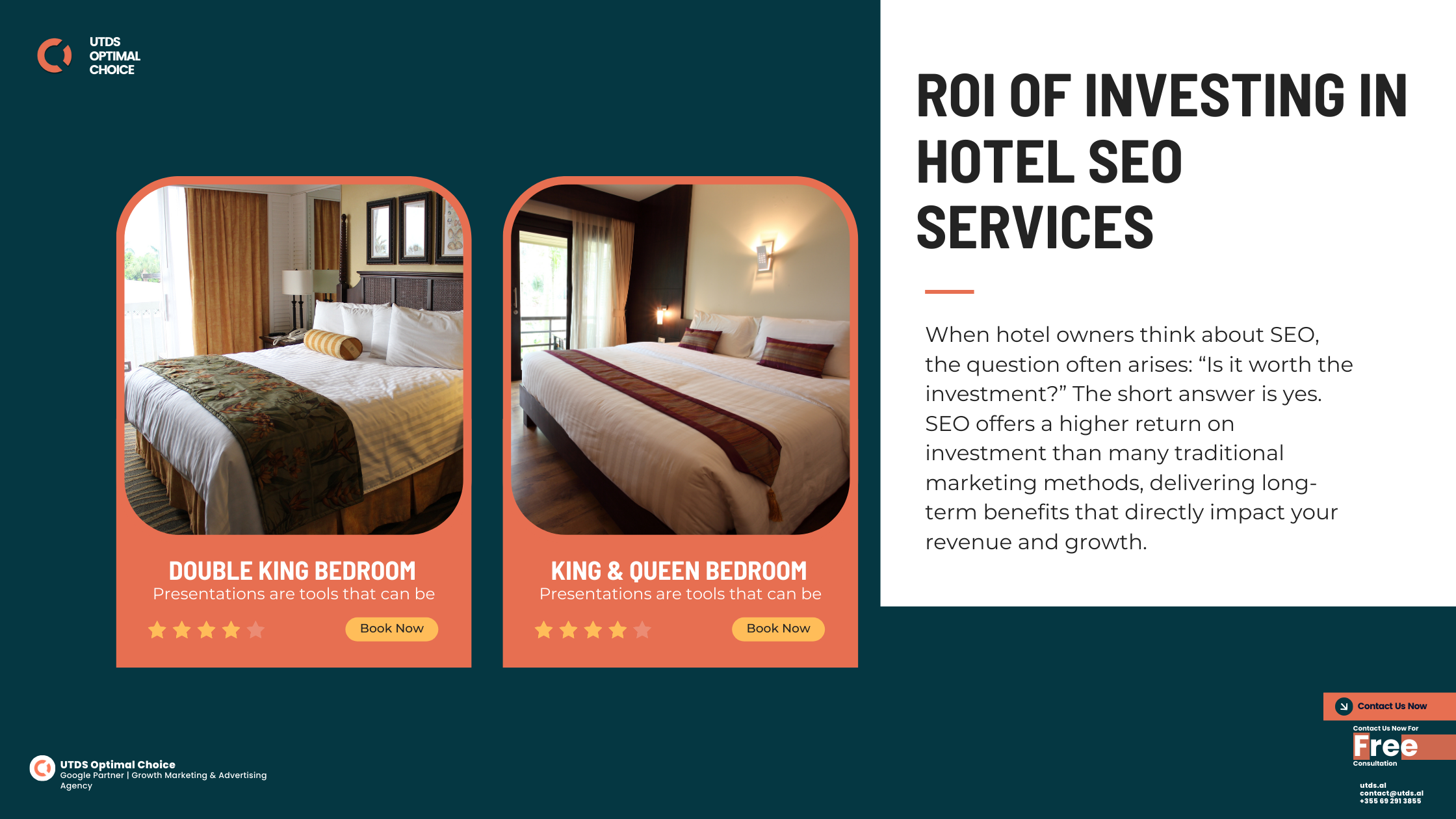
When hotel owners think about SEO, the question often arises: “Is it worth the investment?” The short answer is yes. SEO offers a higher return on investment than many traditional marketing methods, delivering long-term benefits that directly impact your revenue and growth.
A professional Hotel SEO Company ensures that every pound you spend on Hotel SEO Services translates into measurable results, such as increased visibility, higher bookings, and reduced marketing costs.
1. More Direct Bookings, Less Reliance on OTAs
Partnering with a trusted Hotel SEO Agency helps your website rank for user intent SEO Keywords For Hotels, driving direct traffic and bookings. This reduces your dependence on OTAs and their hefty commission fees. Resorts also benefit from specialised SEO For Resorts strategies, targeting affluent travelers searching for premium stays.
2. Long-Term Value and Sustainability
Unlike paid advertising, which stops working the moment you stop paying, SEO provides lasting results. With targeted SEO Services For Hotels, your website remains visible for valuable keywords long after the initial optimisation. For example, once a luxury resort ranks for “seaside resorts in Cornwall,” it continues to draw organic traffic, creating a sustainable growth channel.
3. Lower Marketing Costs
By driving organic traffic, SEO reduces the need for costly PPC campaigns or heavy reliance on OTA listings. Properties that invest in Local SEO For Hotels also see significant cost savings, as nearby guests find and book directly through the property’s website.
4. Improved Conversion Rates
SEO not only drives traffic but also attracts the right audience. For instance, targeting seasonal keywords like “Christmas getaways near London” or “summer resorts in Devon” ensures you’re reaching guests actively planning their trips. A skilled Hotel SEO Consultant fine-tunes your website to convert this traffic into bookings, maximising your ROI.
5. Strengthened Brand Authority
Appearing consistently at the top of search results builds trust and credibility among potential guests. A reliable Hotel SEO Company enhances your brand authority by earning backlinks from trusted travel websites and publishing valuable content that showcases your expertise.
Why ROI is critical in SEO for Resorts and Hotels
In the highly competitive hospitality industry, maximising ROI is essential. Using Search Engine Optimisation for Hotels, you can outperform competitors and attract more bookings. With specialised SEO for hospitality industry, you can tailor your strategy to match user search behaviors. An SEO Agency for Hotels understands the challenges of the SEO for hotel industry and offers comprehensive Hotel website SEO services to boost your visibility. With professional Hotel SEO Services, your property benefits from:
- Higher visibility in search engine results.
- More direct bookings with fewer acquisition costs.
- A sustainable strategy that keeps delivering value over time.
Don’t leave your property’s success to chance. Partner with an experienced Hotel SEO Company today and unlock a higher ROI with expert strategies tailored to your business.
57% of website traffic originates from mobile and tablet devices. This shift underscores the necessity for hotels to have mobile-optimised websites. Partnering with a proficient hotel SEO company ensures that your site is responsive and user-friendly across all devices, enhancing the user experience and improving search engine rankings. An experienced hotel SEO consultant can provide insights into mobile SEO best practices, ensuring your hotel remains competitive in the online market. Comprehensive hotel SEO services include mobile optimisation strategies that cater to the growing number of mobile users. Investing in SEO services for hotels that prioritise mobile responsiveness can lead to increased engagement and bookings. Collaborating with a reputable hotel SEO agency guarantees that your website meets the latest mobile optimisation standards. Choosing an adept SEO agency for hotels ensures your online presence is accessible and appealing to users on all devices.
Common Mistakes You Make Without The Help Of Hotel SEO Agency
Running SEO without expert guidance can often lead to costly mistakes that hinder your hotel’s growth. Many properties unknowingly implement ineffective strategies that fail to deliver results, wasting time and resources. Partnering with a trusted Hotel SEO Company ensures your strategy avoids these pitfalls and drives measurable results.
Here are some of the most common mistakes hotels make without professional Hotel SEO Services:
1. Targeting the Wrong Keywords
Many hotels focus on overly broad or irrelevant keywords, such as “best hotels,” which are too competitive and fail to attract the right audience. A reliable Hotel SEO Agency specialises in finding high-intent SEO Keywords For Hotels, like “luxury seaside resorts in Cornwall” or “boutique hotels near Manchester,” ensuring your efforts attract guests ready to book.
2. Ignoring Local SEO For Hotels Opportunities
Local searches are crucial for attracting nearby guests and last-minute bookers. Without Local SEO For Hotels, your property may not appear in “near me” searches or Google Maps results. This oversight is especially damaging for boutique hotels and resorts, where proximity to local attractions is a significant selling point.
3. Neglecting Mobile Optimisation
With over 50% of travelers booking hotels on their mobile devices, ignoring mobile responsiveness is a critical mistake. A professional Hotel SEO Consultant ensures your site provides a seamless mobile experience, improving both rankings and conversion rates.
4. Overlooking Technical SEO
Issues like broken links, slow loading pages, and missing schema markup can go unnoticed without technical expertise. These problems negatively impact your site’s performance, making it harder for search engines to rank your pages. A skilled Hotel SEO Company resolves these issues, ensuring your website runs smoothly and efficiently.
5. Outdated or Irrelevant Content
Search engines prioritise fresh, relevant content. Many hotels fail to update their blogs, landing pages, or FAQs, leading to a decline in rankings. A trusted Hotel SEO Agency creates engaging travel guides, seasonal blogs, and location-specific content using SEO Services For Hotels to keep your site relevant and engaging.
6. Missing Niche Opportunities for Resorts
Luxury properties like resorts often miss out on niche audiences due to poorly targeted strategies. Specialised SEO For Resorts focuses on high-value travelers searching for premium experiences, such as “family-friendly resorts near Brighton” or “all-inclusive seaside resorts.” This approach ensures resorts capture the attention of affluent guests.
Why Professional Hotel SEO Agency Help Is Essential
Avoiding these mistakes requires time, expertise, and the right tools. Partnering with a reliable Hotel SEO Consultant ensures your property benefits from proven strategies, avoiding common pitfalls and delivering tangible results.
Don’t let common SEO mistakes limit your success. Partner with an experienced Hotel SEO Company today to build an effective strategy and avoid costly errors.
How To Get Started With Hotel SEO Services

Optimising your hotel’s online presence can feel overwhelming, but starting with professional Hotel SEO Services is easier than you think. By partnering with a trusted Hotel SEO Company, you’ll unlock tailored strategies that help your property rank higher, attract the right guests, and increase bookings.
Here’s a step-by-step guide to get started:
1. Schedule an Initial Consultation
The first step is to connect with a reliable Hotel SEO Agency. During this consultation, you’ll:
- Discuss your goals, challenges, and target audience.
- Learn how specific strategies like SEO For Resorts or Local SEO For Hotels can drive traffic and bookings.
- Understand how your property can compete more effectively in search results for high-value keywords like “seaside resorts near Devon.”
2. Conduct a Complete Hotel Website SEO Audit
A professional Hotel SEO Consultant will perform a detailed audit to identify areas that need improvement. This includes:
- Reviewing technical issues such as page speed and mobile responsiveness.
- Analysing your site’s performance for important SEO Keywords For Hotels like “luxury villas near London.”
- Checking for opportunities to implement structured data, such as schema markup for guest reviews and pricing.
3. Keyword Research and Strategy Development
Targeting the right audience starts with in-depth keyword research. Your Hotel SEO Company will:
- Identify key terms like “family-friendly resorts in the UK” or “boutique hotels near Edinburgh.”
- Develop a strategy to integrate these keywords into your website through landing pages, blogs, and metadata.
- Create seasonal campaigns using SEO Services For Hotels to capture peak booking periods.
4. Implementation of SEO Strategies
Once the plan is finalised, the Hotel SEO Agency will begin implementing targeted strategies, including:
- Optimising content and meta tags with relevant keywords like SEO For Resorts and Local SEO For Hotels.
- Adding schema markup to enhance visibility in rich snippets.
- Improving mobile usability and website structure to align with user search intent.
5. Continuous Monitoring and Adjustments
SEO isn’t a one-time process, it’s an ongoing effort. A trusted Hotel SEO Consultant will:
- Monitor your rankings for critical terms like SEO Keywords For Hotels and adjust strategies as needed.
- Stay ahead of search engine algorithm updates.
- Identify new opportunities, such as emerging trends in the hospitality industry or location-based keywords.
Why Partnering With SEO Agency For Hotels Matter
Attempting SEO on your own can be time-consuming and less effective without expertise. Partnering with a professional Hotel SEO Company ensures that every aspect of your strategy is handled with precision, allowing you to focus on what you do best, delivering exceptional guest experiences.
Take the first step toward transforming your hotel’s online presence. Schedule a consultation with an experienced Hotel SEO Agency today and discover how tailored strategies can drive real results for your property.
Creating high-quality and relevant travel content is essential for achieving success in hotel SEO. Partnering with a professional hotel SEO company can help develop content strategies that resonate with your target audience, improving engagement and search engine rankings. An experienced hotel SEO consultant understands the nuances of the hospitality industry and can craft content that highlights your property's unique offerings. Comprehensive hotel SEO services include content creation tailored to attract and convert potential guests. Investing in SEO services for hotels ensures your website provides valuable information, enhancing user experience and boosting SEO performance. Collaborating with a reputable hotel SEO agency guarantees that your content aligns with current SEO best practices, driving more organic traffic to your site. Choosing a specialised SEO agency for hotels ensures your content strategy is designed to meet the specific needs of the travel market.
Why Choose Our Hotel SEO Services?
SEO is essential for hotels looking to stay competitive in the ever-evolving hospitality market. From increasing direct bookings to attracting both local and international guests, a professional Hotel SEO Company provides the expertise needed to grow your online presence.
By investing in tailored Hotel SEO Services, your property can rank higher in search results, drive organic traffic, and reduce dependency on OTAs. Whether you’re running a boutique hotel, a luxury resort, or a family-friendly property, expert SEO ensures your business thrives in a competitive market.
How a Trusted Hotel SEO Company Can Transform Your Business
At UTDS Optimal Choice, we specialise in providing tailored Hotel SEO Services that deliver measurable results. Here’s how we can help:
Customised Strategies for Your Property:
Whether you manage a boutique hotel or a luxury resort, we create personalised strategies to meet your goals.
Keyword Optimisation and Content Creation:
Our team identifies high-intent SEO Keywords For Hotels and crafts engaging blogs, travel guides, and landing pages.
Local and International SEO:
With expertise in Local SEO For Hotels and multilingual campaigns, we help your property attract both local travelers and international guests.
Specialised SEO for Resorts:
We implement SEO For Resorts to capture affluent travelers looking for premium experiences, boosting visibility for luxury properties.
Technical SEO Expertise:
From improving site speed to adding schema markup, we handle all technical aspects to enhance rankings and user experience.
Comprehensive Reporting and Support:
Our detailed reports track your performance, showing how our efforts translate into higher rankings, traffic, and bookings.
Our SEO Agency for Hotels focuses on delivering measurable results that help your property attract more guests. Through proven Search Engine Optimisation for Hotels strategies, we improve your website’s performance and visibility. Our services include detailed Hotel website SEO to ensure seamless user experiences and advanced SEO for hospitality techniques tailored to connect with your ideal audience. Whether you’re just entering the SEO for hotel industry or striving to improve your current rankings, our customised solutions ensure long-term success.
Let’s grow your bookings and transform your online presence. Contact us today to learn how our expert Hotel SEO Services can help your property thrive. Partner with the UK’s leading Hotel SEO Agency today and unlock the full potential of your online presence.
Ready to grow your rankings with expert Hotel SEO Services? Partner with our trusted Hotel SEO Company and start seeing results today. Contact us now for a free consultation.
Ready to boost your bookings with our expert Hotel SEO Services?
Partner with the Hotel SEO Company trusted by top hospitality brands. Let’s grow your online presence today! Contact us today for a free consultation and start seeing real results!
Frequently Asked Questions
What are Hotel SEO Services?
Hotel SEO Services are specialised strategies designed to optimise your hotel’s online presence. From improving your search rankings to driving direct bookings, these services ensure your property is visible to potential guests searching for accommodations online.
How Can a Hotel SEO Company Help My Business?
A trusted Hotel SEO Company like UTDS Optimal Choice helps your business grow by implementing tailored strategies that improve your website’s visibility, attract more guests, and increase direct bookings.
What does a Hotel SEO Company do?
A professional Hotel SEO Agency optimises your website for search engines by improving site performance, targeting relevant keywords, and creating content that drives more direct bookings.
How do Hotel SEO Services help attract direct bookings?
By ranking your website for high-intent SEO Keywords For Hotels and providing an excellent user experience, SEO increases the likelihood that guests will book directly on your site.
Why is Local SEO important for hotels?
Local SEO For Hotels ensures your property ranks for searches like “hotels near me” or “resorts near London,” helping you attract nearby guests and last-minute bookers.
How can SEO benefit luxury resorts?
Specialised SEO For Resorts targets niche audiences, such as travelers seeking premium experiences. Optimising for these audiences increases visibility and bookings for high-end properties.
How do I measure the success of Hotel SEO Services?
Success is measured through metrics like organic traffic growth, improved keyword rankings, increased direct bookings, and reduced OTA commissions. A trusted Hotel SEO Consultant will provide detailed reports to track these results.
key Hotel SEO Checklist
Effective hotel search engine optimization helps UK hotels rank higher on search engines and attract more direct bookings. Here’s a streamlined checklist to improve your online presence:
- Mobile Optimization: A mobile-friendly site improves user experience and plays a key role in hotel search engine optimization rankings.
- Local Keywords: Use location-specific terms like “hotels in London” alongside your hotel search engine optimization efforts to attract local search traffic.
- Quality Content: Publish helpful content such as local travel guides, which naturally supports your hotel search engine optimization strategy.
- Schema Markup: Adding hotel schema helps search engines display key details like pricing and availability, enhancing your hotel search engine optimization performance.
- Guest Reviews: Positive reviews on platforms like Google improve both trust and hotel search engine optimization rankings.
- Loading Speed: Faster websites improve both user satisfaction and search visibility, making it essential for hotel search engine optimization success.
- Security Matters: Use HTTPS to protect guest data while strengthening your hotel search engine optimization results.
- Regular SEO Audits: Ongoing audits ensure your hotel search engine optimization efforts stay effective by identifying technical issues and performance gaps.
Implementing these strategies will strengthen your hotel search engine optimization, helping UK hotels attract more guests and secure higher rankings.

